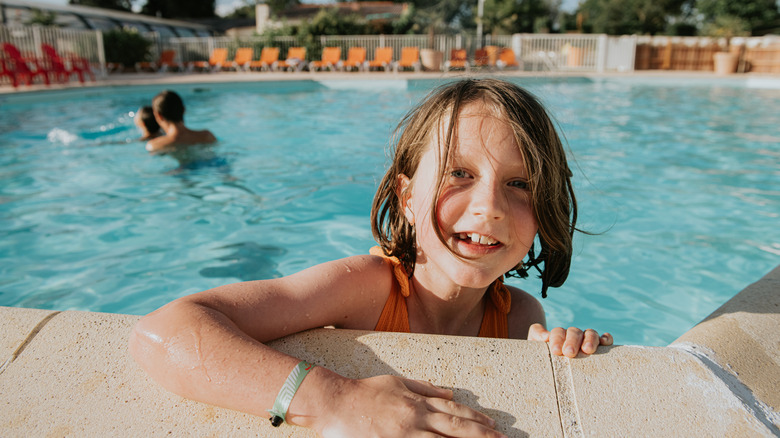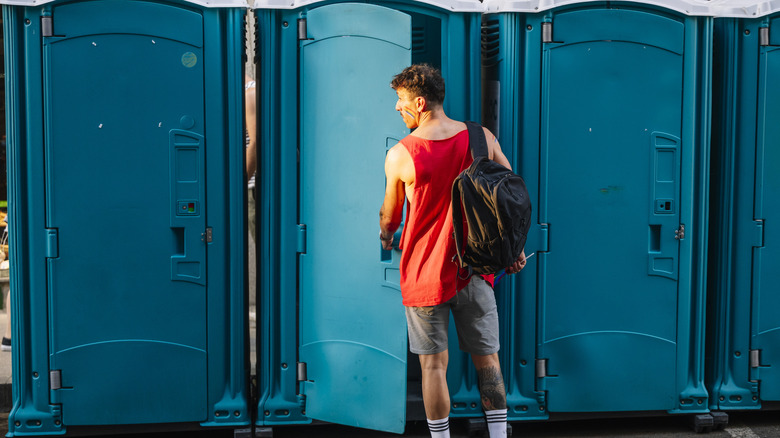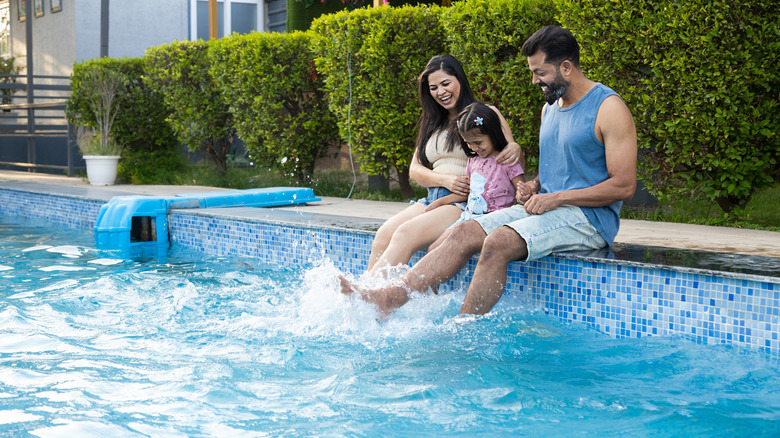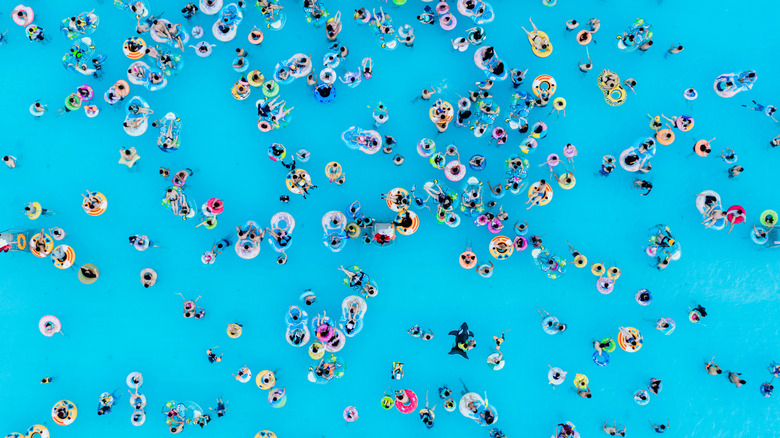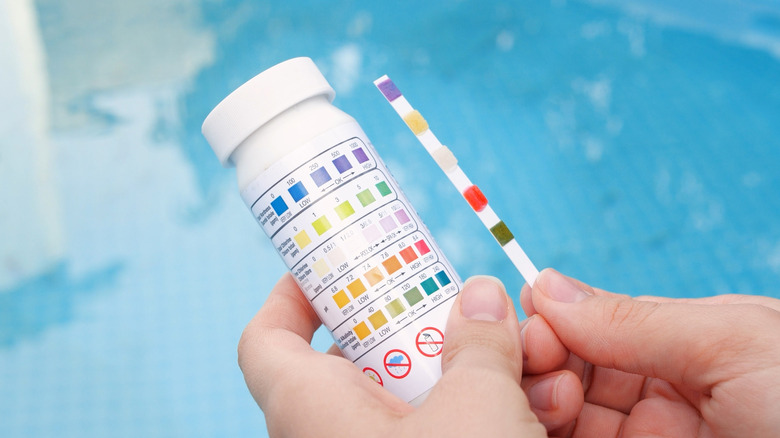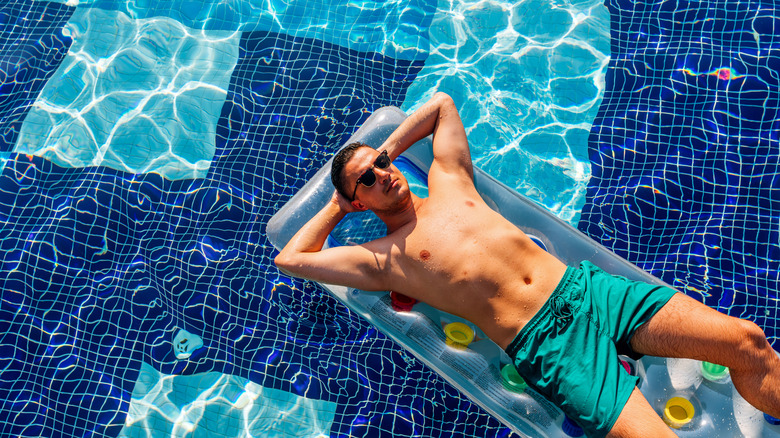The Grossest Things That Are Frequently Found In Hotel Pools
For many travelers, a summer vacation isn't complete without at least one trip to the pool. Whether the pool is the main focus, like if you visit one of the world's largest swimming pools in a world-class South American resort, or if a pool is just part of the scenery, taking a dip is almost a requirement.
Unfortunately, as inviting as the water may look from the surface, there could be a whole other (and much nastier) story hidden inside. According to the Centers for Disease Control (CDC), over 200 disease outbreaks occurred in public pools in the United States between 2015 and 2019, affecting over 3,600 swimmers. While it's enticing to believe that chlorine and other chemicals can keep pool water relatively clean, the reality is much more complicated.
In many cases, even treated pools can harbor infectious bacteria and diseases, along with elements that can just give you the "ick" even if they don't necessarily make you sick. So, before you beat the heat in someone else's backyard through the Airbnb for pools or jump into the hotel pool, consider what may be lurking under the waves.
Urine
Have you ever taken a dip and come out of the water with red, itchy eyes? It's a common enough experience and most people assume the problem is too much chlorine. Yes, too much of any one chemical can cause adverse reactions, but the real issue is actually urine.
What happens is that the ammonia in pee (and sweat) bonds with the chlorine to create chloramines. These nasty elements are what make your eyes burn and turn red, not the chlorine itself. In fact, in many cases, the chlorine levels for a pool are similar to what you'd find in regular tap water.
Fortunately, there's a quick and easy way to tell if a pool has too much pee in it: the sniff test. If the water has a strong, distinct chlorine smell, it's probably full of excess urine and sweat. So, you'll want to swim or dip your toes in at your own risk.
Cryptosporidium
These days, the word "crypto" is often associated with cryptocurrencies like Bitcoin. However, if you're planning on swimming at your summer hotel, you should know that there's another type of "crypto" you should be worried about, although this one won't drain your bank account. Instead, it's short for cryptosporidium, which is found in diarrhea.
Now, one would assume that someone having a case of the runs inside a public pool would cause everything to shut down and be cleaned. But, even if that happens, crypto has a nasty habit of staying around for up to several days, even with chlorine in the water. So, even if the hotel or pool owner does their due diligence, it's likely that the crypto will stick around, unless all the water is drained and refilled.
Worse yet, one doesn't have to have a full-blown "accident" to put these germs into the water. Small amounts of diarrhea can dissipate quickly, meaning other swimmers may have no idea something's in the water until they're getting sick. Ideally, anyone at risk of having diarrhea shouldn't swim, but that doesn't always happen, especially if little kids are in the pool too.
Sweat and Other Bodily Fluids
As we mentioned, sweat can react with chlorine and create chloramines that irritate your eyes and skin. To make matters worse, when it's a hot summer day and everyone is already wet because of the water, it's impossible to know how much sweat seeps into the pool (but it's probably more than we'd care to imagine). Over time, the chlorine can only handle so much ammonia, so it gets weaker and less effective, meaning the pool needs to be refreshed more often, especially when the water is crowded.
But sweat is only one bodily fluid that can ruin your mental image of swimming in a hotel pool. Yes, urine is another worst-case scenario, but the body produces all kinds of gross fluids and byproducts. Saliva, snot, dandruff, body hair; all of it can wind up in the water and, if you're not careful, go down your throat.
Finally, consider how many chemicals people put on their bodies before going into a pool. Sunscreen is the most common, but there may be lotions, shampoos, and other ointments that can wash off after an hour or two in the water.
Pseudomonas and Legionella
Pseudomonas are a type of bacteria that are relatively common in the environment, including swimming pools. Typically, chlorine kills this bacteria pretty well, but not always. Remember, when the pool is crowded, the chlorine has to contend with more chemicals and fluids, meaning it won't be as effective against Pseudomonas and other microbes. Also, if the pool isn't cleaned and treated regularly, the bacteria can proliferate quickly.
Legionella, which causes Legionnaire's disease, is another problematic bacterium that can be found in hotel pools and hot tubs. Unfortunately, chlorine isn't very effective at killing Legionella, so even if you're swimming in a freshly treated pool, it may still harbor this pathogen.
In both cases, these elements typically get into swimming pools when people don't shower before getting into the water. Swimmers may have this bacteria on their bodies and transfer them to the pool, where they can thrive if the chemical balance isn't suitable.
Tips for staying safe when swimming in hotel and public pools
At this point, you might be wondering if going into a public pool is worth it anymore. Even if you book a stay at one of the best all-inclusive resorts with out-of-this-world pools, the mental image of bacteria and bodily fluids might be too off-putting. Thankfully, there are a few ways to minimize the risk and enjoy the water safely on your next vacation.
First, manage your own germs and pathogens. Shower thoroughly before getting into the water, and don't even think about peeing in it. Use the bathroom first, and avoid the pool altogether if you feel like you might have diarrhea. Second, try to avoid getting any water in your mouth, and definitely don't swallow anything. You can also wear goggles and other protective gear if you're worried about chloramines irritating your skin and eyes.
As a rule, crowded pools will have many more germs and fluids, so try to avoid getting in the water during the busiest periods. You may also want to ask the hotel manager or pool owner when the water was last cleaned and refreshed. If a hotel doesn't clean the pool at least a few times a week, the water might be riskier. Finally, hot tubs offer the perfect environment for bacteria to thrive, making them far worse than pools, especially when you consider that the hot water makes people sweat more. So, try to avoid the jacuzzi altogether.
